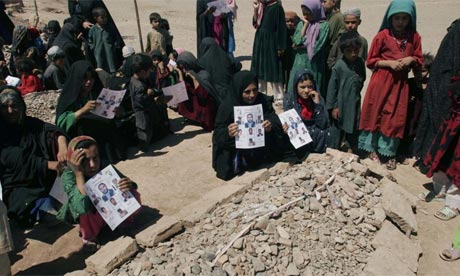
A picture from an Afghan funeral in August, brought about after a US raid.
One of the arguments I've frequently heard in defense of Obama's troop surge in Afghanistan is that it would reduce the need of deadly air strikes -- not that I agree with the premise that we should take any sort of military action in the country when it's strongly opposed by the country's populace, which isn't at all pro-terrorist, just pro-we-don't-want-to-be-blown-up. But that doesn't seem to be what's happening:
US-led air strikes have killed dozens of Afghan people, the Red Cross said today as the Pentagon launched a joint investigation into what appeared one of the deadliest incidents and heaviest civilian losses so far at the hands of coalition forces.
Rohul Amin, the governor of Farah province in west Afghanistan, where the bombing took place during a battle on Monday and Tuesday, said he feared 100 civilians had been killed.
And from Democracy Now's interview with the Red Cross:
AMY GOODMAN: And any firsthand accounts that you got from Red Cross who were there speaking to people on the ground, the survivors?
JESSICA BARRY: As I say, it was the—the worst part for us was the volunteer from the community-based first aid, from the Afghan Red Crescent, who was killed.
But it’s so much more important than the individuals in this situation. Whenever there is fighting, civilians are always the ones that get caught up in it. And it is really a message which the ICRC passes to all of the sides, whether it be Taliban suicide bombers who blow themselves up in markets, whether it be air strikes, whether it be night raids, whether it be fighting. Where there are civilians and where this happens in populated areas, it’s absolutely essential that the civilians are spared and kept safe as much as possible.
This, very sadly, is not the first incident that there has been civilian casualties. As you well know, over the past year, civilian casualties have gone up in Afghanistan. The fighting is intensifying. It’s spreading. And it’s a huge priority to make sure that civilians are safe, that they are kept free from harm, and that situations like this do not happen.
Finally, from Reuters:
Villagers who survived the bombing of houses packed with terrified civilians told Reuters by telephone dozens of members of one extended family alone had died. They wept as they spoke of orphaned children and burying loved ones' fragmented remains.
"My son and my daughter in-law have been killed and left me with a 13-month-old baby," said Gul Bibi from Geraani village.
"Their remains were buried in a mass grave with others, and I didn't even have a chance to see his face for the last time because his body was blown apart," she sobbed.
The bombings, that lasted around an hour, killed 50 members of neighbor Sayed Azam's extended family, Azam told Reuters.
"There were Taliban in the area, and fierce fighting during the day but it ended when it was dark. People thought the fighting was over when suddenly bombings began," he said.
Rohul Amin, governor of Farah province, where the bombing took place late on Monday and fighting raged into Tuesday, said he feared 100 civilians had been killed. Provincial police chief Abdul Ghafar Watandar said the death toll could be even higher.
If confirmed, those even higher figures could make the incident the single deadliest for Afghan civilians since the campaign to topple the Taliban in 2001.
Karzai called the civilian deaths "unjustifiable and unacceptable," and would raise them with Obama at their meeting in Washington later on Wednesday, his office said. He dispatched a joint Afghan-U.S. delegation to investigate.
The war in Afghanistan, of course, isn't really about US security. It's about the geopolitical struggle for the region, which is really aimed more at Russia and China and their growing ties in the region than anything else. Once the US military enters a region, it doesn't like to leave. Just ask Germany and Japan. Having troops in a country means you have a lily pad from which to launch further operations in the future; you can monitor governments and quickly respond to any sort of independence or nationalist movement. Afghanistan is in a central location with proximity to Iran and Syria; it is currently the site of important pipeline building for an energy conduit across Central Asia. It has a lot of geopolitical importance, which is why so many people have spent so much time and money over history to try to military impose what they want on Afghanistan.
It seems like NATO is the newest hegemon to step up to the plate to do exactly that, and by the furthering of continual atrocities like this, they are going to continue to give propaganda to militants like those that staff the extremist Islamist groups in the region. The two will continue to feed on each other's violence, and it will be civilians, like Gul Bibi, who do not want any part in all of this political maneuvering -- because that is what war is, politics by other means -- who will be caught in the crossfire.



0 comments:
Post a Comment